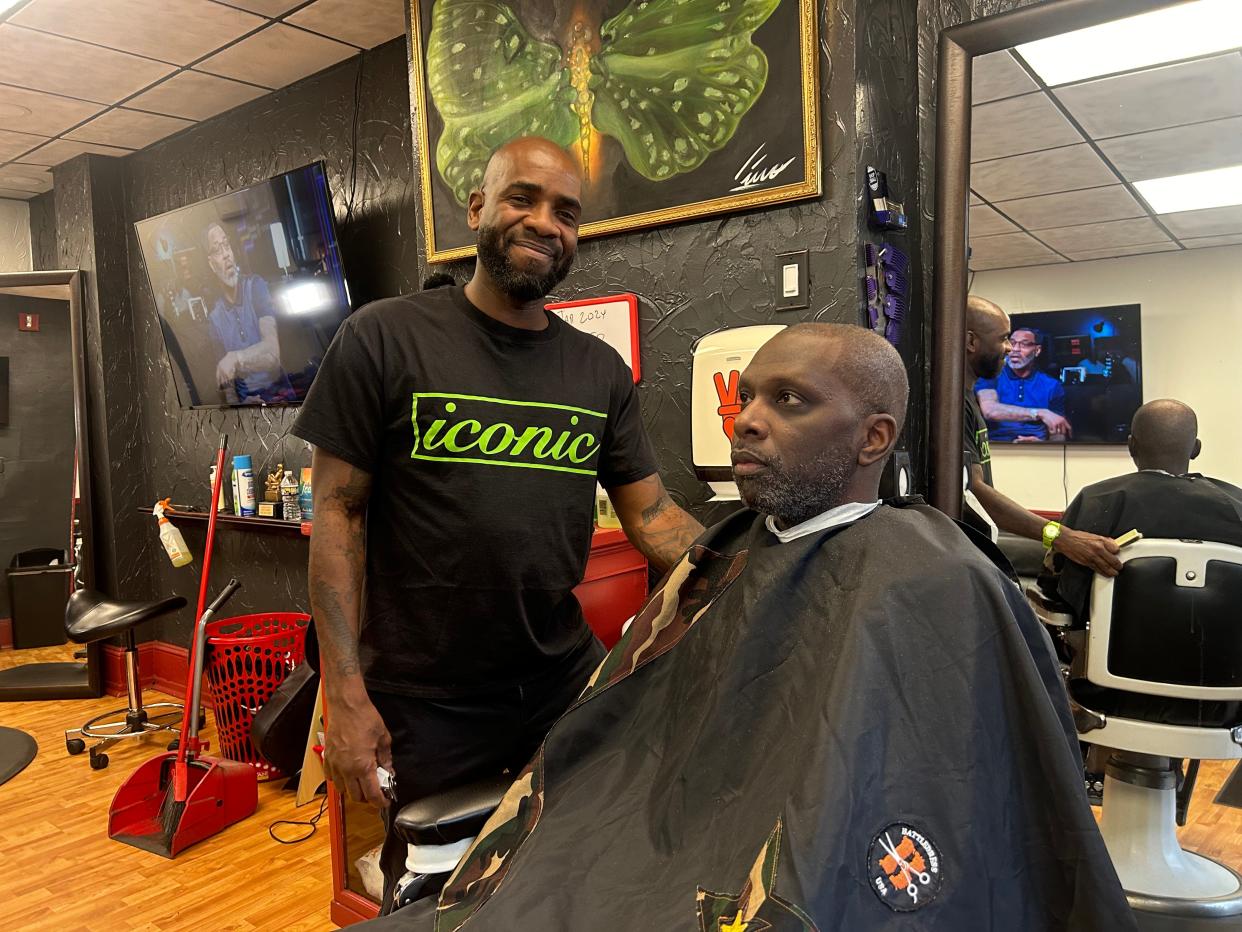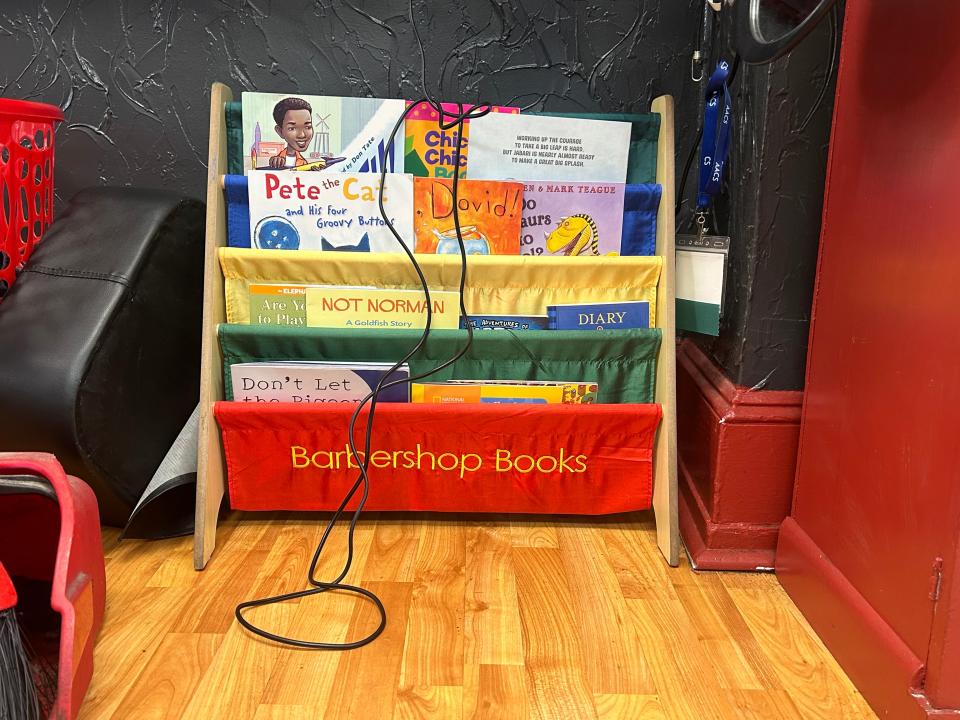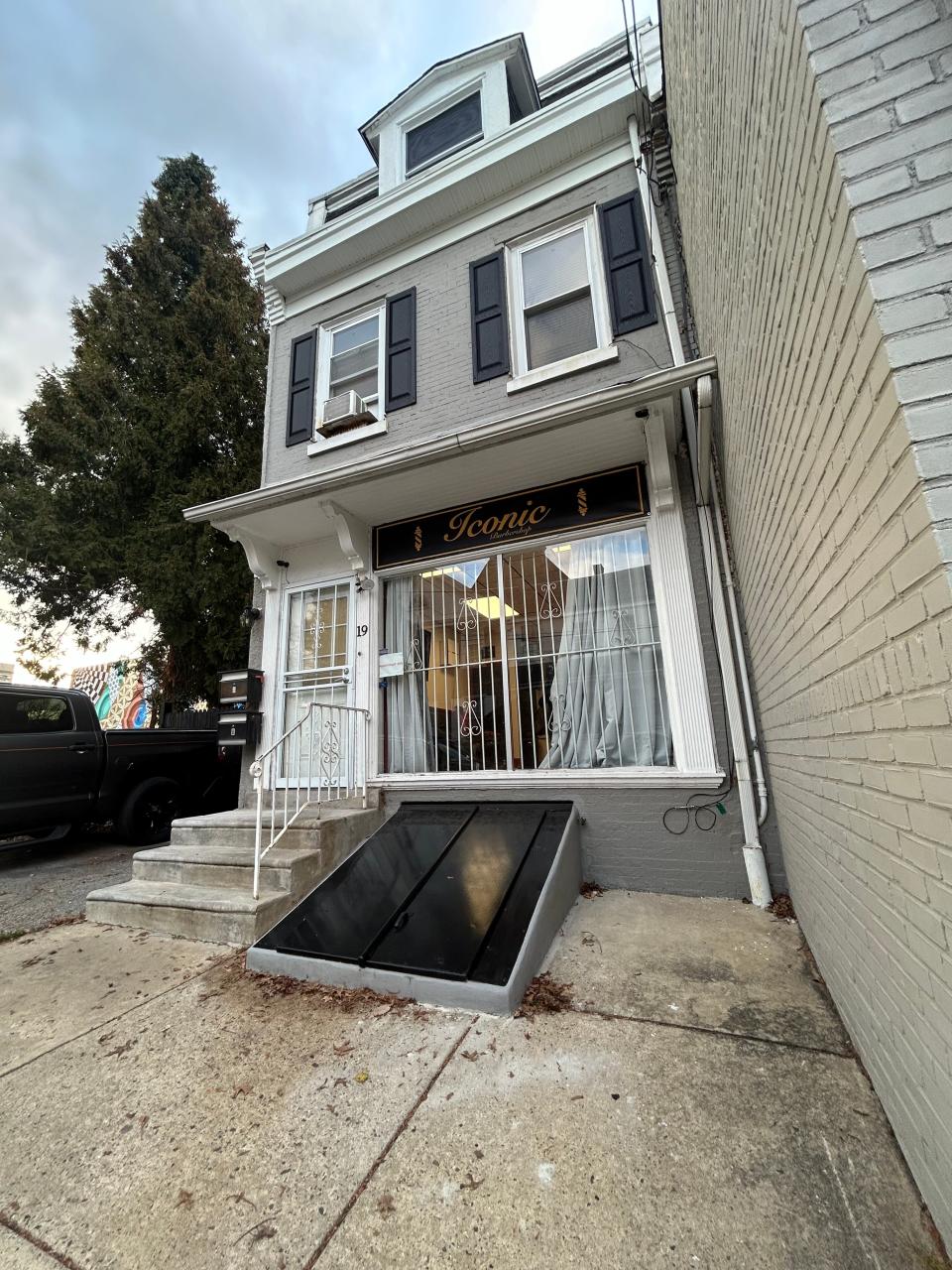Black barbershops are creating a buzz − over books. So young readers can just 'be boys.'

PHILADELPHIA – When he was a boy, "The Adventures of Captain Underpants" just made Brandon Poole laugh.
It's one of several books on a fabric shelf at Iconic Barber, along with titles such as "Chicka Chicka Boom Boom," "Pete the Cat and His Four Groovy Buttons" and "Not Norman: A Goldfish Story."
"I don't know what it was, I guess something about the underpants," said the 30-year-old, sitting on a couch in the barbershop owned and operated by his father, Wanza Poole. "I thought it was so funny."
That's exactly the reason Alvin Irby, founder of Barbershop Books, wanted to place the popular series of children's chapter books in neighborhood shops like this one in the Germantown section of Philadelphia.
Irby, a former educator, wanted to meet kids where they are and reinforce the importance of early literacy. And while he sees the value of Black children, especially boys, seeing characters and authors who look like them, he also believes the best way to get them to love reading is to make it fun.
"Black boys are more than just their skin color," Irby said. "They want to read about trucks. They want to laugh. So many of the books that feature Black boys don't give them a chance to be boys: silly or gross or funny."
Books such as the wildly popular "Captain Underpants," "Big Nate" and "Diary of a Wimpy Kid" series, while they don't center on Black characters and aren't written or illustrated by Black people, are beloved by kids for their relatable situations, easy readability, comic-inspired art and, yes, their gross-out humor.

Let Black characters in books 'just be'
Barbershop Books chooses its titles by asking boys at events they host at shops, schools and after-school programs.
A native of Little Rock, Arkansas, whose mother was a public school teacher for 30 years, Irby launched the New York City-based nonprofit in 2013 after stints in elementary school classrooms and with the Boys Club. He found that Black boys "don't want to read whack books."
"It's an 'and,' not an 'or'," he said: Books by and about Black characters are important for representation. But representation isn't enough when it's robbing those characters of individuality when they're meant to be a prototype and not a fully formed person. And, Irby noted, too often Black characters in children's books can't be silly or gross − or misbehave.
"They don't think of those things with a white character," he said. "(White characters) can just be."
Barbershop Books, he said, "tries to amplify Black characters but also create spaces that recognize the individuality of Black boys."
Today, Barbershop Books has provided titles for various ages to 250 shops in 20 states and more than 50 cities.

Why place books in barbershops?
"Black barbershops are some of the few local businesses owned by people from the neighborhood," Irby said. They transcend social and economic barriers; they're places where Black men, and boys, can be themselves. "It's a really unique opportunity for a variety of interactions, not just about reading but also about culture and masculinity."
Irby said that with many poor Black children being raised by single mothers, barbershops also represent a place to see male role models and a place for youths to experience meaningful interactions. Less than 7% of K-12 teachers are Black men, according to Pew Research Center, which also impacts what books Black children are exposed to. "It's about cultivating a reading identity and involving men in that, so Black men are part of children's reading experience."
Wanza Poole, Iconic's owner/operator and a longtime resident of Germantown, a working-class neighborhood where 62% of residents are Black, said clients in his shop are like family. Men who sat in the 52-year-old's chair as children now bring in their own sons. He lives above the shop he's owned since 2008 and has clients who have been coming to him since the 1990s.
And those men, including James Blakely, who was in the chair the day USA TODAY visited, talk about books. Poole enjoys nonfiction: books about leadership, spirituality, and entrepreneurship. Blakely calls himself "a rotational reader": He'll read a memoir, then fiction, then something about history, switching genres to keep his mind sharp.
"It’s like a secret book club with your friends, you know?" Poole said. "We talk about the books we read, we’ll recommend a book, talk about what we like and didn't like."
He and his customers value education and while parts of Germantown have been hotspots for gun violence in a city that's seen 397 homicides so far this year, the blocks around Iconic are relatively quiet.
Poole envies today's kids, who have a much more varied array of books to choose from than he remembers: "It was all the Narnia stuff, Dr. Seuss, that stuff," he said.
His clients "love the idea of books in here," and Poole encourages kids to grab a book while they wait or as they hop into the chair.
His only request for Barbershop Books? More titles by Black authors, featuring Black characters.
Contact Phaedra Trethan by email at ptrethan@usatoday.com, on X (formerly Twitter) @wordsbyphaedra or on Threads @by_phaedra.
This article originally appeared on USA TODAY: NYC nonprofit Barbershop Books is helping make reading fun for kids

